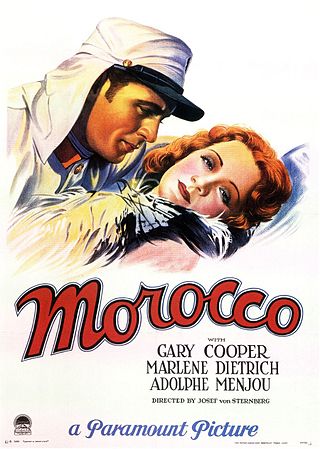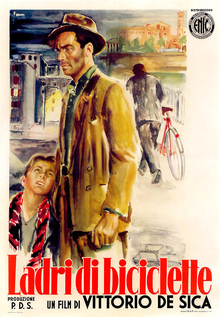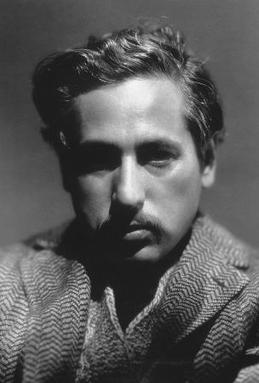Bibliography
Weinberg's book-length publications, some of which are collections of shorter pieces of journalism, are as follows:
|
Herman G. Weinberg (9 August 1908 – 7 November 1983) was an American subtitler, film journalist and author. He pioneered the use of English subtitles for foreign films, beginning in the early days of sound film and continuing until the 1960s. [1] He subtitled more than 300 foreign films, including many classics. He wrote several books on film as well as an autobiography, A Manhattan Odyssey (1982). He was an expert on the films of Ernst Lubitsch, Josef von Sternberg and Erich von Stroheim.
Weinberg's film translation work grew out of an early job rearranging the symphonic scores of imported German silent films for the string quartet at the Fifth Avenue Playhouse in Manhattan. [2] In an interview from 1960 he describes his early experiments in titling foreign films:
At first we tried the technique used for silent pictures. Every couple of minutes there would be a full-screen title announcing that 'Eric has left Maria to go to Switzerland with Hedwig. We shall see what happens.' But that didn't work because there were always a few people who could understand German, and they would laugh at the spoken jokes in the film. Everybody else got annoyed because they thought they were missing something [...] [3]
Using a Moviola, Weinberg then began to superimpose titles over the moving images of the film:
At the beginning, I was very cautious and superimposed hardly more than 25 or 30 titles to a ten-minute reel...Then I'd go into the theatre during a showing to watch the audience's faces, to see how they reacted to the titles. I'd wondered if they were going to drop their heads slightly to read the titles at the bottom of the screen and then raise them again after they read the titles [...] but I didn't have worried [...] they didn't drop their heads, they merely dropped their eyes, I noticed. [4]
Weinberg went on to translate films from a number of languages, including some languages he did not know, and for which he was obliged to work from a literal translation. He subtitled films from German, French, Italian, Spanish, Hungarian, Greek, Czechoslovak, Swedish, Japanese, Finnish and Hindi. [5]
Alongside his subtitling work Weinberg was also a cinema manager in New York and Baltimore in the 1930s and 1940s. [6] His short silent film Autumn Fire, [7] made in 1931, and starring Erna Bergman and Willy Hildebrand, is considered an example of contemporary avant-garde filmmaking. [8] He was a contributor of articles to, among others, Close Up , Films in Review, Sight & Sound , Film Culture and Cahiers du Cinéma . [9] In 1960 Weinberg served as a judge for the fourth annual San Francisco International Film Festival.
In 1970 Fritz Lang provided a preface for Weinberg's book Saint Cinema, calling Weinberg 'much more than a charming, witty, and amusing raconteur' and 'this Boswell of the art of our century [film]'. [10] Haden Guest says of his film journalism that it 'invented [...] ambitious and often provocative categories of film history'. [11] His books have been translated into several languages; The Lubitsch Touch has been translated into Spanish and French. [12]
Filmmaker and film critic Jonas Mekas writing his film column in the Village Voice gave his 1968 tribute of the year to Weinberg for the Sternberg and Lubitsch books: "[H]e writes with so much love for the movies that you read and you go crazy thinking about where you are going to see those movies, and when." [13]
Weinberg's papers are preserved in the Archives and Manuscripts Collection of the New York Public Library. [14]
Over several decades, Weinberg provided English subtitles for more than 300 films. Some notable titles include: [15] [16]
Weinberg's book-length publications, some of which are collections of shorter pieces of journalism, are as follows:
|

Dubbing is a post-production process used in filmmaking and video production, often in concert with sound design, in which additional or supplementary recordings are lip-synced and "mixed" with original production sound to create the finished soundtrack.

Roberto Gastone Zeffiro Rossellini was an Italian film director, producer, and screenwriter. He was one of the most prominent directors of the Italian neorealist cinema, contributing to the movement with films such as Rome, Open City (1945), Paisan (1946), and Germany, Year Zero (1948).

Morocco is a 1930 American pre-Code romantic drama film directed by Josef von Sternberg and starring Gary Cooper, Marlene Dietrich, and Adolphe Menjou. Based on the 1927 novel Amy Jolly by Benno Vigny and adapted by Jules Furthman, the film is about a cabaret singer and a Legionnaire who fall in love during the Rif War, and whose relationship is complicated by his womanizing and the appearance of a rich man who is also in love with her. The film is famous for a scene in which Dietrich performs a song dressed in a man's tailcoat and kisses another woman, both of which were considered scandalous for the period.

Ernst Lubitsch was a German-born American film director, producer, writer, and actor. His urbane comedies of manners gave him the reputation of being Hollywood's most elegant and sophisticated director; as his prestige grew, his films were promoted as having "the Lubitsch touch". Among his best known works are Trouble in Paradise (1932), Design for Living (1933), Ninotchka (1939), The Shop Around the Corner (1940), To Be or Not to Be (1942) and Heaven Can Wait (1943).

Thunderbolt is a 1929 American Pre-Code proto-noir film directed by Josef von Sternberg and starring George Bancroft, Fay Wray, Richard Arlen, Tully Marshall and Eugenie Besserer. It tells the story of a criminal, facing execution, who wants to kill the man in the next cell for being in love with his former girlfriend.

Bicycle Thieves is a 1948 Italian neorealist drama film directed by Vittorio De Sica. It follows the story of a poor father searching in post-World War II Rome for his stolen bicycle, without which he will lose the job which was to be the salvation of his young family.

Josef von Sternberg was an Austrian-American filmmaker whose career successfully spanned the transition from the silent to the sound era, during which he worked with most of the major Hollywood studios. He is best known for his film collaboration with actress Marlene Dietrich in the 1930s, including the highly regarded Paramount/UFA production, The Blue Angel (1930).

Adolfas Mekas was a Lithuanian-born American filmmaker, writer, director, editor, actor and educator. With his brother Jonas Mekas, he founded the magazine Film Culture, as well as the Film-Makers' Cooperative and was associated with George Maciunas and the Fluxus art movement at its beginning. He made several short films, culminating in the feature Hallelujah the Hills in 1963, which was played at the Cannes Film Festival of that year and is now considered a classic of American film.

The Last Command is a 1928 silent film directed by Josef von Sternberg, and written by John F. Goodrich and Herman J. Mankiewicz from a story by Lajos Bíró. Star Emil Jannings won the first Academy Award for Best Actor in a Leading Role at the 1929 ceremony for his performances in this film and The Way of All Flesh, the only year that multiple roles were considered. In 2006, the film was deemed "culturally, historically, or aesthetically significant" by the United States Library of Congress and selected for the National Film Registry. The supporting cast includes Evelyn Brent and William Powell.

The Blue Angel is a 1930 German musical comedy-drama film directed by Josef von Sternberg, and starring Marlene Dietrich, Emil Jannings and Kurt Gerron. Written by Carl Zuckmayer, Karl Vollmöller and Robert Liebmann – with uncredited contributions by Sternberg – it is based on Heinrich Mann's 1905 novel Professor Unrat and set in an unspecified northern German port city. The Blue Angel presents the tragic transformation of a respectable professor to a cabaret clown and his descent into madness. The film is the first feature-length German full-talkie and brought Dietrich international fame. In addition, it introduced her signature song, Friedrich Hollaender and Robert Liebmann's "Falling in Love Again ". It is considered to be a classic of German cinema.
Underworld is a 1927 American silent crime film directed by Josef von Sternberg and starring Clive Brook, Evelyn Brent and George Bancroft. The film launched Sternberg's eight-year collaboration with Paramount Pictures, with whom he would produce his seven films with actress Marlene Dietrich. Journalist and screenwriter Ben Hecht won an Academy Award for Best Original Story.

David Dilley Bannon is an American author and translator, best known for the books Elements of Subtitles and Wounded in Spirit. He translates from Korean-to-English and German-to-English, notably the works of Friedrich Rückert. Bannon was born in Washington State in the United States. The son of photographer Dennis Dilley, he left home at age 19, spending many years in Asia. He taught college for two decades and was curator of Asian art for the Florence Museum of Art and History in South Carolina, USA. Bannon has appeared on The Discovery Channel (1997), Ancient Mysteries (1997), In Search of History (1999), On the Inside (2001), TechTV (2003) and History's Mysteries (2006). He has been interviewed by NPR, Fox News and The Wall Street Journal. He has translated subtitles for 44 South Korean television shows, including East of Eden (2008), The Great Queen Seondeok (2009), Dong Yi (2010), The Greatest Love (2011), Soldier (2012), Lights and Shadows (2011), Nine-tailed Fox (2013) and Mystery Television (2019). In 2006, Bannon was convicted on charges of criminal impersonation. He was sentenced to five years, serving three prior to his release. Married twice, he lost his only child, Jessica Autumn Bannon, to a fentanyl-laced heroin overdose in 2015. Bannon publishes on grief, art, history, culture, and translation, as well as delivering lectures at libraries, museums and conferences.

Subtitles and captions are lines of dialogue or other text displayed at the bottom of the screen in films, television programs, video games or other visual media. They can be transcriptions of the screenplay, translations of it, or information to help viewers who are deaf or hard-of-hearing understand what is shown.

Laborer's Love is a classic silent comedy short film produced in China during the Republican Era, which officially premiered on October 5, 1922 at the Olympic Theater in Shanghai. It is also known as Romance of a Fruit Peddler or Romance of a Fruit Pedlar. Even though filmmaking in China began in the 1890's, Laborer's Love is the earliest complete film from China's early cinematic history that is available today. The film was also one of the earliest productions of the soon-to-be prolific Mingxing Film Company and was directed and written by Mingxing co-founders Zhang Shichuan and Zheng Zhengqiu. Notably, the film has both Chinese and English intertitles, indicating that at this early point in Shanghai cinema history, films were tailored to both Chinese and Western audiences. In addition to the English intertitle cards, the short film further showcased Western influence in Chinese filmmaking, such as taking inspiration from American silent film comedians Charlie Chaplin, Buster Keaton and Harold Lloyd. A subtitled version of the film, which represents differences between the Chinese and English text of the intertitles, is available on YouTube.
A subtitle editor is a type of software used to create and edit subtitles to be superimposed over, and synchronized with, video. Such editors usually provide video preview, easy entering/editing of text, start, and end times, and control over text formatting and positioning. Subtitle editors are available as standalone applications, as components of many video editing software suites, and as web applications.

The Wild Cat, subtitled A Grotesque in Four Acts, is a 1921 German silent, farcical romantic comedy film directed by Ernst Lubitsch. It was shot at the Tempelhof Studios in Berlin.

Natsuko Toda is a Japanese subtitler and film industry interpreter. She has been called "the most famous film translator in Japan [...] unquestionably" and the "Subtitle Queen". She has subtitled more than 1,000 English-language films in Japanese.
Multimedia translation, also sometimes referred to as Audiovisual translation, is a specialized branch of translation which deals with the transfer of multimodal and multimedial texts into another language and/or culture. and which implies the use of a multimedia electronic system in the translation or in the transmission process.

Piero Heliczer was an Italian-American poet, publisher, actor and filmmaker associated with the New American Cinema.
Helen Milsted Eisenman was an Austrian-born American feature film subtitler who worked from the 1960s to the 1990s, becoming one of the best-known subtitlers in the United States. She has been referred to as the 'Queen of Subtitlers'.